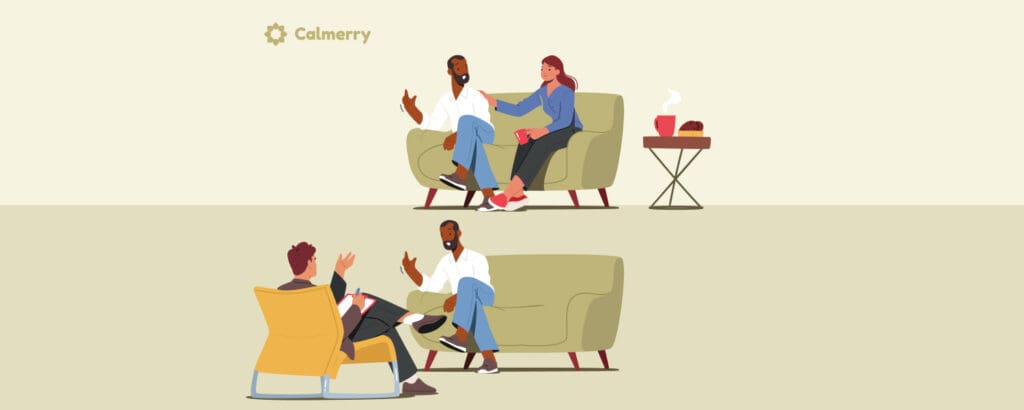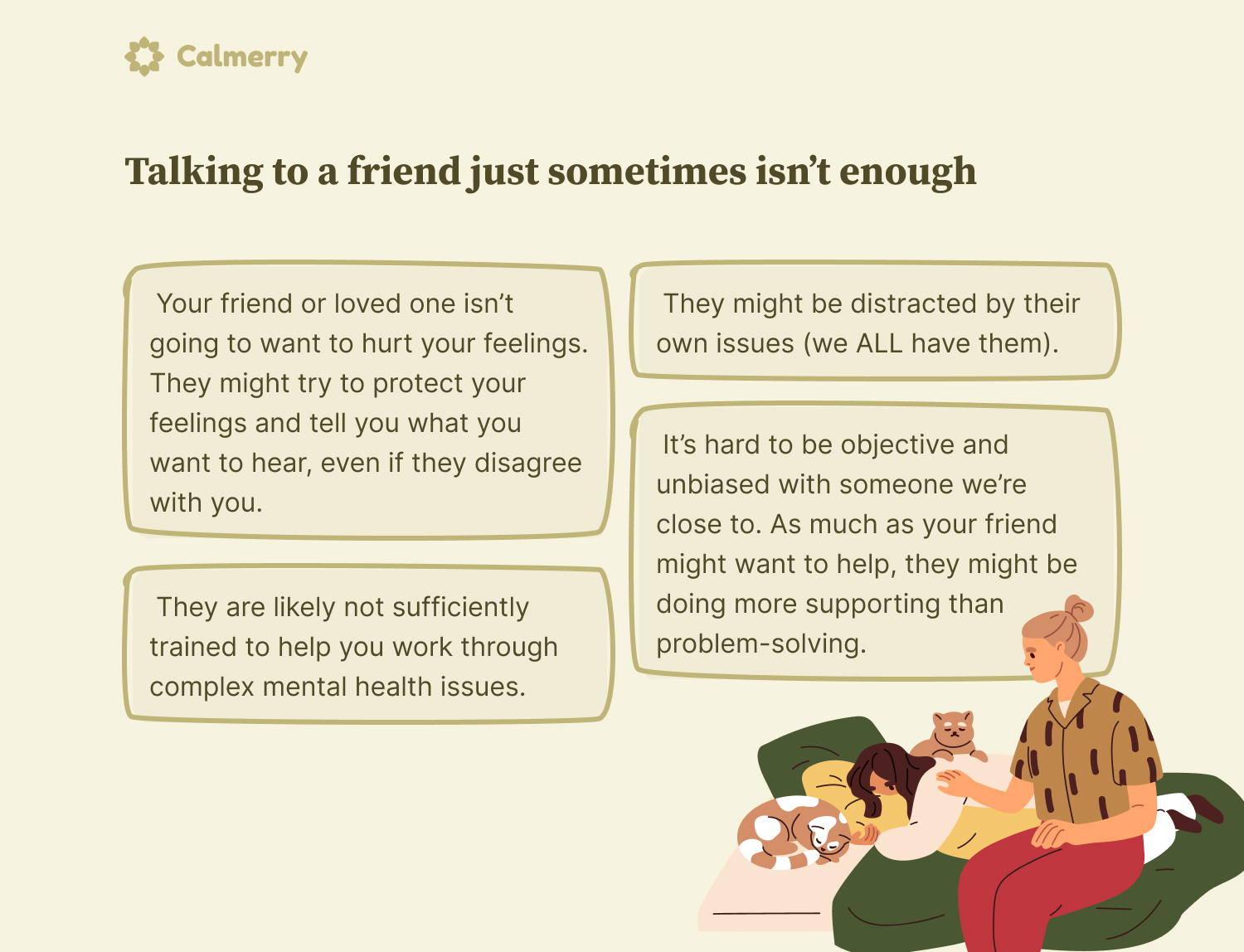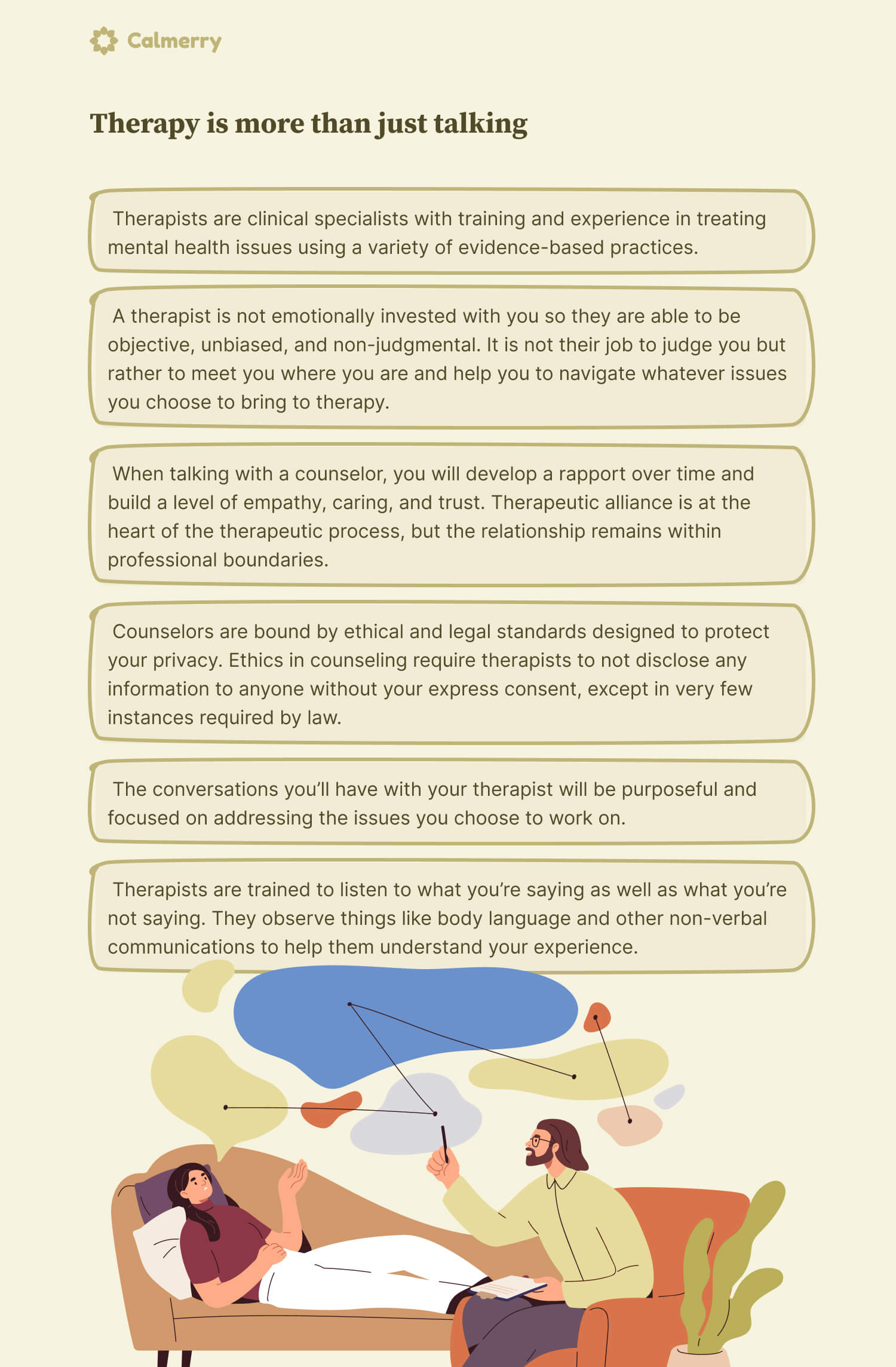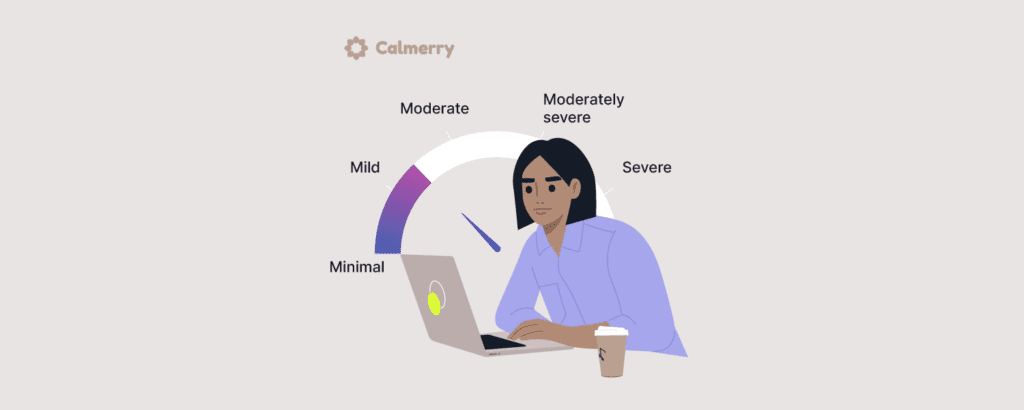Should I Talk to My Friend or a Therapist? Does It Really Matter?

In this article
For many of us, when we’re struggling with something, the first inclination is to talk to a friend. And, honestly, a lot of times, that’s all we need. We just need to vent to someone.
After all, your friend knows you well, they care about you, and you know they have your back. You’ve shared some secrets, and maybe they’ve helped you through some tough stuff. All admirable qualities to have in a friend and confidante for sure.
However, there are times when the support of a friend just isn’t enough.
Sometimes issues arise that are bigger than even the strongest friendship and require skills that your friend probably doesn’t have. Issues like trauma, addiction, anxiety, or depression, for example, require the expertise of someone trained in mental health or addiction treatment.
Now, this doesn’t mean that talking to a friend about a problem isn’t helpful. Of course, it is! We all need someone to share with, vent with, and even commiserate with. And, let’s be real, you probably have lots and lots of examples of how your friend helped you through what you thought was something insurmountable.
Talking to a friend just sometimes isn’t enough. No matter much you hash it out, the problem is still there and maybe even getting worse. It’s not your friend’s fault. You just have to know when the problem is bigger than what a friendship can or should bear.
Despite how it might feel the same, talking to a friend and talking to a therapist are different. But just how does therapy differ from simply talking to a friend or family member about a problem? Here’s a closer look at the differences you (and your friend) need to know.
Why not just talk to my friend?
It can be tempting to just rely on your friend or loved one. After all, they know you best, right? It’s free, and it’s just like therapy because all you’re doing is talking, right? Well, there’s a lot more to it than that.
Friends and family, even a partner or parent, are great for support but not always so good for dealing with complex issues. Of course, they want to help. Your friend is invested in your friendship. Family is family.
While that can make for a great confidante, it sometimes makes for not-so-good problem-solving:
- Your friend or loved one isn’t going to want to hurt your feelings. They might try to protect your feelings and tell you what you want to hear, even if they disagree with you.
- They might be distracted by their own issues (we ALL have them).
- They are likely not sufficiently trained to help you work through complex mental health issues. Even if they are, ethics in counseling (and most similar disciplines) would prohibit them from “treating” you due to your existing relationship.
- Advice, while comforting, might not be helpful. Being friends creates a blind spot. It’s hard to be objective and unbiased with someone we’re close to. It’s a human truth that we see what we want to see based on our emotional biases. (We all have those too.) As much as your friend might want to help, they might be doing more supporting than problem-solving. And that’s not a bad thing, but it just might not be what you need.

Therapy is more than just talking. It’s not advice. It’s not friendship. Therapy, also referred to as psychotherapy or counseling, is a treatment process designed to help people identify and change troubling emotions, thoughts, and behaviors. It is provided by a licensed mental health professional trained to identify and treat mental health issues and disorders using proven techniques. In what way does therapy differ from simply talking to a friend or family member about a problem?
Understanding just what therapy is, and isn’t, can help you decide whether you need a friend or something more. So just what makes talking to a counselor different from talking to a friend?
Training and expertise
Your friend or loved one may have wonderful intentions to help. Chances are though, they are not trained to deal with complex or distressing issues. What they’re able to give you is simply advice and support. While that can be comforting and helpful, it’s not a substitute for treatment when it’s needed.
Therapists are clinical specialists with training and experience in treating mental health issues using a variety of evidence-based practices. They generally hold at least a master’s degree in a mental health discipline (e.g., counseling, psychology, marriage and family therapy) and often hold a doctorate as well.
They complete extensive training requirements and exams prior to becoming licensed and complete ongoing training even after licensure to stay up-to-date on advances in the field.
No judgment zone
Let’s be real for a minute. Some of us have issues that run deep – very deep – and sometimes come with a good bit of fear, guilt, or shame. Maybe you’ve guarded those feelings so closely that you’ve never told another living soul. Now you’re ready to sort it out.
Really working through something requires honesty. Not just the superficial kind, but the real deal, tell-all kind. Are you really ready to bring all of that up with your BFF?
Friends and family, no matter how supportive, are still social relationships that we value and want to keep. We want them to like us, love us, and respect us. Bearing what could be very painful or embarrassing issues can feel vulnerable and open to judgment. As a result, you may find that you struggle to be open or avoid talking about the really hard truths.
A therapist, on the other hand, is not emotionally invested with you, so they are able to be objective, unbiased, and non-judgmental. It is not their job to judge you but rather to meet you where you are and help you to navigate whatever issues you choose to bring to therapy.

Therapy is not friendship
With a friend or family member, you’re likely to talk about all kinds of things and in all kinds of ways. You might talk about your problems, their problems, commiserate, and vent. You might even solve some things along the way. It’s an easy banter that develops between people who are emotionally close.
Talking to a counselor, on the other hand, is different than friends talking. It’s not unusual to hear someone refer to their therapist as “a friend,” but it is not a friendly relationship. When talking with a counselor, you will develop a rapport over time and build a level of empathy, caring, and trust.
That therapist support and connection, sometimes referred to as the therapeutic alliance, is at the heart of the therapeutic process, but the relationship remains within professional boundaries.
Your secret is safe
While you may trust your friend to keep what you’ve shared in confidence, that doesn’t always happen. Keeping secrets is just hard, even for a friend or family member, and it can be unfair to ask them to, especially if it puts them in an awkward position. One of the risks of sharing is that they may accidentally share something you didn’t intend to be shared.
When talking with a counselor, you have the added benefit of confidentiality. Counselors are bound by ethical and legal standards designed to protect your privacy. For example, ethics in counseling require therapists to not disclose any information to anyone without your express consent, except in very few instances required by law.
That means your friends, your boss, or your nosy neighbor can’t just call up and ask for info. When you share with a therapist, you can be assured that your information remains private.
More than just talk
Of course, you’ll talk to your therapist in session, but it’s more than just conversation like you might find among friends. The conversations you’ll have with your therapist will be purposeful and focused on addressing the issues you choose to work on. You’ll make decisions that are right for you.
In therapy, you have your therapist’s undivided attention. Therapists are trained to listen to what you’re saying as well as what you’re not saying. They observe things like body language and other non-verbal communications to help them understand your experience.
Despite popular beliefs, therapy is not advice-giving or non-stop complaining or venting. You’ll be working on issues, but your therapist will not tell you what you should do. What your therapist will work with you is to help you set goals and make a therapy plan that will help you address issues, build skills and use your strengths to make choices that are right for you.
You might still be wondering, even with all these differences, does therapy work? Research says yes.
The case for therapy
While mental healthcare is more accessible than ever before, and even with all the reasons to go, you may still wonder if therapy really works.
According to the American Psychiatric Association, most people who seek therapy find it helpful in reducing symptoms and improving functioning. In fact, studies have shown that about 75% of people who seek mental health care benefit from it and that people who attend therapy fare better following treatment than 80% of people who don’t choose therapy.
What about online therapy? The support for seeing a therapist online is equally as impressive. Online counseling has made seeking help more accessible than ever. Evidence suggests that online counseling is at least as effective, and in some cases, may be more effective than in-office counseling.
It’s also private, convenient, and you can see someone on a schedule that fits your busy lifestyle.
The bottom line
When it comes to talking with a friend vs. therapy, it doesn’t have to be one or the other. You need support and advice from a trusted friend. You might also need the help of a therapist, especially if you’re feeling stuck or distressed.
Engaging with a Calmerry therapist provides you with access to someone who is trained to help you explore your issues and learn skills to cope in healthy ways. And that leaves you free to enjoy your friendship and keep it healthy and thriving.
online therapy
live video session


